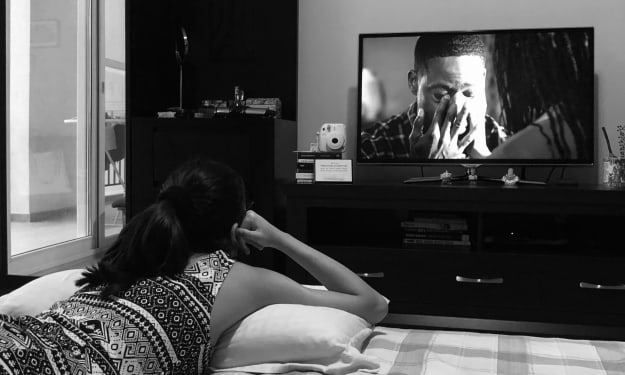
Simran Lavanya Saraf
Bio
When I'm not oversharing my thoughts on the internet, you will find me devouring chocolate, making good use of my Netflix account, or asking strangers if I can pet their dogs.
Stories (13/0)
Part 2: Why You Can’t Stop Looking at Your Phone and What to Do About It
In my previous article, I discussed the role of dopamine in our constant need to check our phones. Often, designers manipulate our brain chemistry in relation to dopamine with the hopes of increasing the amount of time we spend on their apps. In this article, I will provide you with tips on how to try and overcome this, with insight from Catherine Price’s How to Break Up with Your Phone.
By Simran Lavanya Saraf3 years ago in Psyche
Part 1: Why You Can’t Stop Looking at Your Phone and What to Do About it
Why can’t we stop picking up our phones? Well, these little devices have us typing, tapping and swiping away because they instantly and simply deliver some of our most basic needs, including pleasure.
By Simran Lavanya Saraf3 years ago in 01
The Problematic 'Cool Girl' Trope
When thinking about gender representation in the media a myriad of stereotypes come to mind, most of which communicate ideals of gender that perpetuate unrealistic and limiting perceptions of who we should be. One such trope worth exploring is the ‘Cool Girl’ trope, which is more than just a fictional stereotype played on screen. An article by Jason Hellerman aptly refers to this trope as a “Real Life Fantasy, Screenwriting Nightmare”.
By Simran Lavanya Saraf4 years ago in Geeks
What Do Algorithms Tell Us About Prejudice in Society?
People are often put off when they hear the word algorithm and write it off as too technical to understand. However, algorithms are all around us. They have a huge impact on society and democracy, and how we experience our digital world. Hence, our understanding of them on at least some level is crucial.
By Simran Lavanya Saraf4 years ago in 01
Sick and Tired (of the Misinformation)
I was recently diagnosed with fibromyalgia. There is a lot of mystery and misinformation surrounding this condition, even in the medical community. To help my friends and family understand more about this, I decided to write an article about fibromyalgia.
By Simran Lavanya Saraf4 years ago in Longevity
'Her Status Says Online'
Many social media apps and websites share information about whether a person is online with their network (e.g. friends list), which are known as online status indicators. Importantly, these online status indicators convey our availability to others. They inform them about whether we are online or offline, and often even indicate the last time we were logged on. Recently, my friend told me that he has to limit his use of WhatsApp because otherwise his ex will see that he is online and try to initiate a conversation. If you’ve ever suspected that you’re being ghosted after a second date after getting no reply to your several messages or impatiently waited for a response from your friend who is online but not replying to you amidst an argument, then you would be painfully aware of just how much anxiety that little online indicator is capable of causing.
By Simran Lavanya Saraf4 years ago in Humans
Do Yourself a Favor and Watch 'This Is Us'
Unless you live under a rock you’ve probably heard about a television series called This Is Us. The social media gush on this phenomenal show has been plentiful. Perhaps you know someone who watches it every week, preferably with a box of tissues nearby (that person is definitely me). In this article I explain why I love this show so much, while avoiding any spoilers for those who haven’t watched it yet.
By Simran Lavanya Saraf5 years ago in Geeks
Book Review: Catherine Gray's 'The Unexpected Joy of Being Single'
Over half of 25-44 year olds are now single, thus making it the norm. However, single-shame is highly prevalent, with many worrying that they are the 'last ones left on the shelf' or 'all the good ones are gone." The Unexpected Joy of Being Single is a refreshing book that explores this single stigma. While doing so, Catherine Gray redefines a person who is single as someone who is complete on their own, and not lacking in any way. Her book helps to make a long overdue cultural shift in the way single people are perceived (and most importantly: how they perceive themselves). She is here to help us locate and luxuriate in some single joy.
By Simran Lavanya Saraf5 years ago in Humans
We Need to Stop Apologising for Our Appearance
As I met my friend for lunch, I noticed her lovely pink nails and complimented her choice of colour. “Sorry they’re a mess, I haven’t had time to get them done recently,” she said. That’s when it struck me: women apologising for their appearance is an all too common occurrence. And there’s undeniably no reason it should be like this. There was absolutely nothing wrong with her nails that day. And even if there was, she doesn’t owe me anything?
By Simran Lavanya Saraf5 years ago in Viva
Don't Let the Fear of Not Being Good Enough Stop You from Having Fun
This article serves as a reminder than we are allowed to do things ‘just for fun’. The attitude of not pursuing something unless we are going to be the very best in that area has robbed many of joy and the benefits of having hobbies. Hobbies are a vital part of life, and we do not have to be the best in order to benefit from their various advantages.
By Simran Lavanya Saraf5 years ago in Motivation
We Need to Embrace Self-Compassion, Instead of Chasing Self-Esteem
Googling self-love reveals that it has "often been seen as a moral flaw, akin to vanity and selfishness." This baffles me because regard for oneself and one's own happiness and wellbeing is far from a flaw in my eyes.
By Simran Lavanya Saraf5 years ago in Motivation
We Teach People How to Treat Us from the Treatment We Accept
People often say and do things that we may not like or that might hurt us. It’s an inevitable part of life and is bound to happen in all types of relationships. However, not expressing our feelings and thoughts about such things to the person tells them that it is okay to repeat it again in the future. We teach people how to treat us from the treatment we accept.
By Simran Lavanya Saraf5 years ago in Humans













